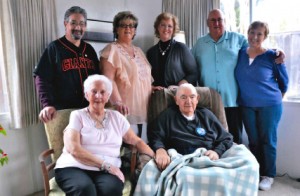Neal Love: Comprehensive support for whole family
 February 2013
February 2013
Bess Love remembers the first thing that impressed her when she met future husband Neal in 1945.
“I fell in love with his shiny shoes,” she recalled during a recent interview in her San Mateo home. By the time he died, four months shy of their 65th wedding anniversary in 2011, the couple had shared a lifetime of ups and downs, raised three children and had seven grandchildren and seven great-grandchildren. It wasn’t always easy.
“I was too stubborn to get a divorce,” she said of the hard times, but they weathered their problems and enjoyed their family life. Neal, who had grown up in a foster family and was a decorated World War II veteran, worked as a warehouseman and took up golf in retirement. She volunteered for 18 years at the Samaritan House thrift shop after raising their children.
Still, when Neal entered his final illness as he approached age 90, the family was at a loss because they hadn’t dealt with a close family death before. They were taken aback when Neal’s doctor recommended hospice.
“I thought that if you have hospice, that’s a death sentence, and they just come and hold your hand,” son Mike Love recalled. Mission Hospice and Home Care’s Dr. Gary Pasternak explained that hospice care can start up to six months before a doctor anticipates a death.
“Dr. Pasternak knew we were shocked and gave us time to process,” said Mike. “He stayed with us for two hours and took some of the fear out of it. He demystified it so it was in layman’s terms that we could all understand. “
The hospice team swung into action not only to provide medical care, but family support. Neal started to open up about his war experiences to social worker Roby Newman, something he’d always declined to discuss with his family.
Mike said directions from hospice staff were always “suggestions and never directives. The family and patient are always in control and have the final say.”
The family exercised that option when they decided to withdraw from hospice care and admit Neal to a hospital. Possibly having flashbacks of his war experiences – he had a Bronze Star and two Purple Hearts from his service as a Navy medic in the Pacific – Neal was fighting to get out of bed.
“We understood that in doing so, Mission Hospice would no longer be able to assist us in the decision process,” Mike said. “Even so, Dr. Barnes (Dr. Pasternak was absent) stayed in constant contact with us during the 2 ½ days Dad was in the hospital. That guy was my rock. He was on the phone with me probably every 45 minutes the night before Dad died.
“Then, at Dad’s memorial service, several staff members were in attendance. It was a great tribute to our dad as well as a comfort to our family. They have continued to stay in contact with my mother and always offer any assistance she might need.”
As he told the audience during last year’s Light Up a Life remembrance service, having hospice made an enormous difference for their whole family.
“Having Mission Hospice available is like having a bright ray of sunshine breaking through a very black and dreary sky,” he said. “We shall forever be indebted to them.
